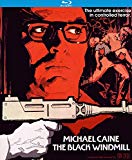| Reviews & Columns |
|
Reviews DVD TV on DVD Blu-ray 4K UHD International DVDs In Theaters Reviews by Studio Video Games Features Collector Series DVDs Easter Egg Database Interviews DVD Talk Radio Feature Articles Columns Anime Talk DVD Savant Horror DVDs The M.O.D. Squad Art House HD Talk Silent DVD
|
DVD Talk Forum |
|
|
| Resources |
|
DVD Price Search Customer Service #'s RCE Info Links |
|
Columns
|
|
|
Black Windmill, The
It's slickly made and intelligent, but unmemorable. I'd seen the British DVD, released in 2006, yet remembered absolutely nothing about the movie, except maybe that there was a black windmill in there somewhere. Watching the Blu-ray was like seeing it for the first time all over again. It's basically a mishmash of Hitchcock's The Man Who Knew Too Much with a dash of John le Carré with a dash of Caine's Harry Palmer films.
McKee (John Vernon) and Ceil (Delphine Seyrig), identified later as arms smugglers working on behalf of the IRA, kidnap the only son of married British "spook" (spy) Maj. John Tarrant, who is investigating them. McKee, in phone calls to Tarrant's residence, identifies himself as "Drabble," and demands to speak with Tarrant's superior, Cedric Harper (Donald Pleasance). Harper agrees to receive the next phone call from the kidnappers, who then demand 500,000 British pounds in uncut diamonds Harper just happens to have under lock and key at MI6. How would the kidnappers know this?
Harper refuses to pay the ransom, and meanwhile investigators from MI5, and local police detectives (including those played by Joss Ackland and Clive Revill) begin to suspect Tarrant has faked the kidnapping. Further, for reasons not clear until the end, McKee and Ceil plant incriminating evidence at Tarrant's second apartment, including a Polaroid of Ceil nude on his bed. As Tarrant's wife, Alex (Janet Suzman) becomes increasingly frantic, especially when she hears her son being tortured over the phone line, Tarrant takes matters into his own hands.
Adapted from Clive Egleton's novel Seven Days to a Killing, The Black Windmill tells its story well but lacks a point of view other than a vague cynicism about the spy game. Some reviews criticized Caine's reticent response to his son's kidnapping; until almost the end he shows little emotion, a reflection of his training, he explains. Caine's presence can't help but invite comparisons to his three Harry Palmer films (The Ipcress File, Funeral in Berlin, and Billion Dollar Brain), and The Black Windmill plays almost like a sequel to the first one, with Palmer married with son, domesticated somewhat but still at it. The Ipcress File found the perfect balance between the gadget-obsessed, self-parody that the Bond movies were fast becoming, and the more serious and subtle end of the spy genre, exemplified by The Spy Who Came in From the Cold, from le Carré's novel. What's lacking here is that the audience never really gets inside Tarrant's head beyond a single-mindedness to get his son back, whatever it takes.
The tone of the film is subtle and serious, though interrupted by a few amusing if misplaced in-jokes, including an awkward reference to Sean Connery. At one point Caine is seen at the Dominion Theater, where Battle of Britain, whose large cast included Caine, is playing.
The rest of the cast is fine, especially Suzman, as Mrs. Tarrant. Some of her best scenes occur late in the film, as she conspires with her husband, secretly meeting and passing along messages to one another, which has the curious effect of drawing them closer as a married couple. Donald Pleasance is comparatively low-key as Tarrant's boss, an obsessive-compulsive with no sense of empathy toward Tarrant's plight. Around this period especially, Pleasance had the reputation as a notorious scene-stealer, doing bits of business to attract attention his way (in 1972's Death Line, Pleasance all but juggles chainsaws) but here he mostly keeps this sort of thing in check. The supporting cast is very good in sketchily defined parts, including the actors Joseph O'Conor (Mr. Brownlow in Oliver!), Catherine Schell, Denis Quilley, Edward Hardwicke, Hermione Baddeley, and (briefly and uncredited), John Rhys-Davies.
Video & Audio
Filmed in Panavision, The Black Windmill has an interesting look, part early-‘70s rough edge, part-slick Panavision thriller, and the DTS-HD mono audio is acceptable. Note: The opening titles are, for some reason, severely windowboxed, too much so, but the rest of the film looks fine. Optional English subtitles are provided on this region "A" encoded disc.
Extra Features
Supplements include a very good (if barely edited on-camera interview with the film's director of photography, Ousama Rawi, who has many interesting things to say about the production. Also included is an audio commentary by filmmaker and historian Mike Siegel (apparently no relation) who discusses the director's career at length particularly. Also included is a trailer, image gallery, and six radio spots.
Parting Thoughts
Not great but certainly interesting throughout and generally good, just a bit disposable. The Black Windmill is Recommended.
Stuart Galbraith IV is the Kyoto-based film historian largely absent from reviewing these days while he restores a 200-year-old Japanese farmhouse.
|
| Popular Reviews |
| Sponsored Links |
|
|
| Sponsored Links |
|
|
| Release List | Reviews | Shop | Newsletter | Forum | DVD Giveaways | Blu-Ray | Advertise |
|
Copyright 2024 DVDTalk.com All Rights Reserved. Legal Info, Privacy Policy, Terms of Use,
Manage Preferences,
Your Privacy Choices | |||||||













